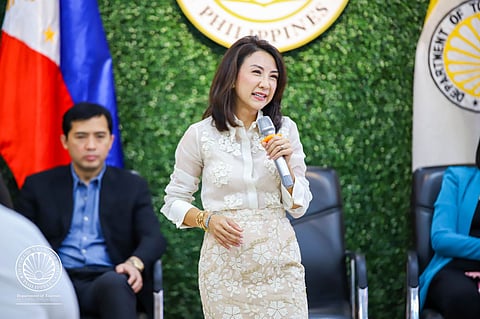
- NEWS
- the EDIT
- COMMENTARY
- BUSINESS
- LIFE
- SHOW
- ACTION
- GLOBAL GOALS
- SNAPS
- DYARYO TIRADA
- MORE

Following the order of President Ferdinand Marcos Jr. for the Department of Foreign Affairs to roll out Digital Nomad Visas (DNV), or foreign nationals who earn a living working online in various locations of their choosing, Tourism Secretary Christina Garcia Frasco said such order will improve the number of foreigners visiting the country, benefitting the coffers through tourism receipts.
According to the order of Marcos Jr., Executive Order (EO) 86 would also include those whose clients or employers are situated outside the Philippines, aiming to boost the country's economy and tourism.
According to Frasco, the progressive policy reflects the Marcos Administration’s strong commitment to elevating the Philippines’ tourism landscape through digitalization and innovation.
“Allowing digital nomads the opportunity to stay longer in the country will spur tourism activities and increase visitor spending. Not only do digital nomads help mitigate seasonal fluctuations in tourism by visiting during off-peak times, providing a steadier economic flow, but these types of international visitors also bring diverse perspectives and cultures, enriching our host communities,” the tourism chief said.
Among the popular “workation” destinations in the country are such premier tourist sites as Boracay, Siargao, Cebu, Palawan and La Union.
The DoT has prioritized digital transformation initiatives under the National Tourism Development Plan (NTDP) 2023–2028, recognizing the need to enhance visitor experience.
The DoT has pursued convergences with the Department of Information and Communications Technology to further improve internet connectivity in 94 identified tourist destinations across the country.
The agency has also played a vital role in the government’s rollout of the electronic visa (e-visa) system, working closely with other national government agencies to ensure its successful implementation.
“The DoT has pursued key digital transformation efforts, such as the implementation of the e-Visa system and improved internet connectivity in tourism destinations, through strategic convergence with our partner government agencies,” Frasco said.
“The President’s approval of this initiative only reinforces this administration’s goal to equalize tourism promotion and development across the country. It will not only strengthen the growth of established destinations, but also unlock new opportunities for even the most remote tourist sites and local government units to shine on the global stage,” she added.
Foreigners who wish to apply for this type of visa must be at least 18 years old; must have proof of remote work using digital technology; must show proof of sufficient income generated outside the Philippines; must have no criminal record; must have health insurance valid for the period of the DNV; must be a national of a country that offers DNVs to Filipinos and where the Philippines has a Foreign Service Post; must not pose a threat to the internal or external security of the Philippines, and must not be employed in the Philippines.
The pilot implementation of the digital nomad visa program is expected to start within 60 days of the effectiveness of the order.
Foreigners who will be qualified for the program may enter or stay in the country for a maximum of one year, and can also be renewed for the same duration, and they may be granted multiple entry privileges during the validity of their DNVs.
With the signing of the EO 86, the Philippines now stands at par with other neighboring tourism giants, including Thailand, Indonesia and Malaysia, which are actively implementing the digital nomad visa program.
“With our unparalleled natural beauty, vibrant culture, and the warmth of the Filipino people, the Philippines stands ready to welcome digital nomads to travel, work, and thrive across our islands,” Secretary Frasco said.
According to the Bureau of Immigration data, the Philippines recorded 14,733,597 international arrivals in 2024, while the DoT logged 5,949,350 international visitors.
